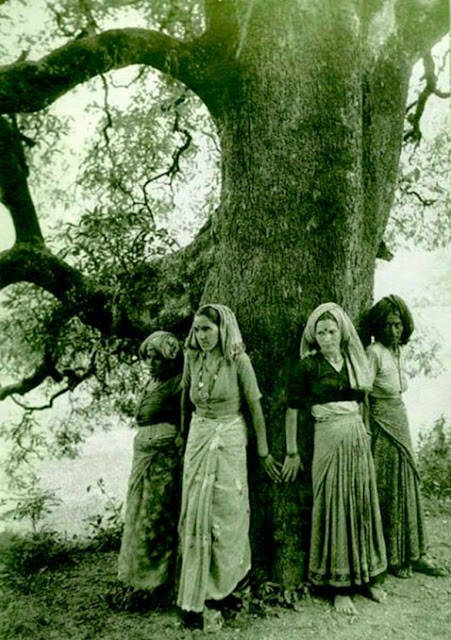An Environmental Revolution: It Starts With Us

"Social Ecology and the Importance of Diversity & Inclusion"
https://www.youtube.com/watch?v=rxYTInBQUtc

Image: Women protecting tree during Chipko movement
https://bohemianbudgie.blogspot.com/2015/11/hindu-tree-huggers-chipko-movement.html
Throughout the timeline of the human race, there is no doubt that we have made many critical blunders regarding the environment, and human rights. Because humans are constantly learning and adapting, we are able to recognize when we are actively creating a problem. The problems start when people are told they have to change certain things in their lifestyle; humans have been stuck in the mindset that we are the most important species out there, and generally refuse to make lifestyle changes at the expense of our personal comfort. In order to really make a difference within stubborn people is to start a radical movement. For something to be radical, it has to challenge or threaten the foundation of a belief system (Hendry 2020). Although there are many examples of radical movements regarding the environment, the ones I want to focus on are deep ecology, social ecology, and ecofeminism.
Deep ecology is a perspective about nature that goes beyond regular environmental ideas. It says that we need to see the connection between humans and the natural world in a deeper way than we ever have before. This perspective, created by a philosopher named Arne Naess, believes that everything in nature is connected and relies on each other. It asks us to understand that all living things and ecosystems are important, no matter if they're useful to humans or not. Deep ecology wants us to change how we think about the environment and our place in it, to value all living things, and work together to live in a way that helps the Earth. It calls for big changes in how we do things in society to really solve environmental problems. Deep ecology is like a reminder to be mindful of nature and take care of it.
Social ecology is a mindset that looks at how people and the environment are connected. Created by Murray Bookchin, it says that our environmental problems are linked to how our societies are organized. Social ecology suggests that we need to change our communities to be more balanced with nature. It wants us to create local communities that work well with the environment and treat everyone fairly. This perspective challenges the idea that some people have more power than others and calls for a society where everyone has a say in decisions. In simple terms, social ecology encourages us to rethink how we live together, making sure it's fair and good for the environment. Here is the link to a great YouTube video that goes more in depth about social ecology: https://www.youtube.com/watch?v=rxYTInBQUtc
Ecofeminism focuses on the connections between the environment and the treatment of women, emphasizing the parallel exploitation of both. Ecofeminists argue that historical patterns of treating women and nature poorly are interconnected, driven by a shared mindset of control and domination. They highlight the harmful consequences of this perspective, leading to environmental degradation and gender inequality. Ecofeminism urges society to shift away from this harmful mindset by promoting equality between men and women and advocating for the respectful treatment of nature. This perspective goes beyond recognizing the problem; it actively calls for change. Ecofeminists believe that a fair and balanced world can only be achieved by addressing the root causes of both environmental degradation and gender inequality. They emphasize the importance of empowering women and respecting the environment to create a harmonious and sustainable global community. By challenging patriarchal norms and promoting ecological awareness, ecofeminism seeks to reshape societal values and practices, encouraging a future where everyone is treated with dignity, gender equality is the norm, and the environment is protected for the well-being of all.
I remember learning about the Chipko movement in one of my classes a few semesters ago. The Chipko movement started in the 1970s in India, and it was a big deal because local people, especially women, hugged trees to stop them from being cut down by loggers. "Chipko" means "to hug" in Hindi. The reason for this was that the forest was crucial for their lives. The forest provided food, work, and was a big part of their culture. Women, in particular, played a key role in this movement because they understood how important the forest was for their community. This movement connects with ecofeminism because both show how problems with the environment and the unfair treatment of women are linked. Ecofeminism says that when we harm nature, we often harm women too. The Chipko movement reflects this idea by showing that the well-being of the environment and the well-being of women are connected. It's like saying we should treat both women and the environment with care and respect. The women in the Chipko movement stood up against cutting down trees, and in doing so, they were also standing up for fairness and a better balance between people and nature.
Hendry, J. (2020). Communication and the Natural World (Vol. 2). Strata Publishing Inc.
Hindu tree huggers: The Chipko Movement. The Bohemian Budgie. (2015, November 1). https://bohemianbudgie.blogspot.com/2015/11/hindu-tree-huggers-chipko-movement.html
Nerdy About Nature. (2021, October 13). Social Ecology and the importance of Diversity & Inclusion. YouTube. https://www.youtube.com/watch?v=rxYTInBQUtc